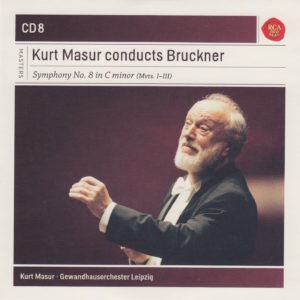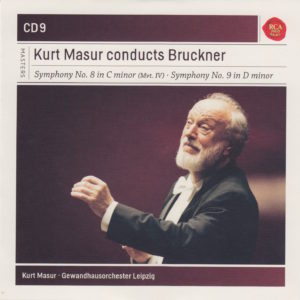 This morning’s conductor of Anton Bruckner’s Symphony No. 8 in C Minor (WAB 108), nicknamed “The Apocalyptic,” although I don’t know why, is Kurt Masur (1927-2015), another person about whom I knew nothing and of whom I had never heard until I started this project.
This morning’s conductor of Anton Bruckner’s Symphony No. 8 in C Minor (WAB 108), nicknamed “The Apocalyptic,” although I don’t know why, is Kurt Masur (1927-2015), another person about whom I knew nothing and of whom I had never heard until I started this project.
Maestro Masur was born in Germany and died in December, 2015, at the age of 88 in Greenwich, Connecticut, U.S.
I first heard the Maestro interpret Bruckner’s symphonies on Day 10, Symphony No. 1.
Then again on Day 26, Symphony No. 2.
Then again on Day 42, Symphony No. 3.
Then again on Day 58, Symphony No. 4.
 Then again on Day 74, Symphony No. 5.
Then again on Day 74, Symphony No. 5.
Then again on Day 90, Symphony No. 6.
Then again, most recently, on Day 106, Symphony No. 7.
Here are the facts about today’s recording:
Bruckner’s Symphony No. 8 in C Minor (WAB 108), composed 1884-1890
Kurt Masur conducts
Masur used the “Original Version (1887),” according to the CD sleeve. But edited by whom? Which edition?
Gewandhausorchester Leipzig plays
The symphony clocks in at 81:53
This was recorded in Leipzig, Germany, on 19-23 June 1978
Masur was 51 when he conducted it
Bruckner was 66 when he finished composing it
This recording was released on the RCA Red Seal label

According to its entry on Wikipedia:
This was Bruckner’s first version of the symphony, but was not published until 1972 in an edition edited by Leopold Nowak. It has some significant differences from the more familiar later versions, including a loud ending to the first movement and a different tonality for the climax of the slow movement. It is also notably longer than the 1890 version, and has a different instrumentation (the most significant consistent difference being that the 1890 version has triple rather than double woodwind throughout the first three movements). The double woodwind of the 1887 version gives a somewhat more austere character to the overall sound of the work.
Some scholars support this version of the symphony. Bryan Gilliam, for example, argues that the later version (from 1890) is shorter and smoother, and is hence a dubious concession to the Brahms-loving bourgeoisie of the time.
Given that, I’m guessing the editor for Maestro Masur’s symphony is Leopold Nowak.
Bruckner wrote his symphonies in four parts. The time breakdown of this one (Symphony No. 8 in C Minor), from this particular conductor (Masur) and this particular orchestra (Gewandhausorchester Leipzig) is as follows:
I. Allegro moderato…………………………………………………………………………….18:56
II. Scherzo. Allegro moderato…………………………………………………………….14:18
II. Adagio. Feierlich langsam; aber nicht schleppend……………………….26:26
IV. Finale. Feierlich, nicht schnell……………………………………………………….24:13
Total running time: 81:53 (over two CDs: CD 1 is 57:40 , CD 2 is 24:13)
And now for my subjective assessment:
My Rating:
Recording quality: 4
Overall musicianship: 4
CD liner notes: 0 (totally unacceptable)
How does this make me feel: 5
This was remarkably good. Much better than Maazel’s recording yesterday.
I was pulled in from the first minutes of the Allegro. That’s how I can usually tell if I’m going to like a recording. If I am drawn in at all, it will happen within the first 2-3 minutes. That’s when I know if the recording is to my liking, if the performance has the magic I look for, and if it feels right. Masur’s Allegro is particularly moving. And I was transported.
The Scherzo was also exceptionally good. Uplifting. Stirring.
The Adagio was sublime, especially the beautiful French horn solos. Both the Allegro and the Adagio carried enough depth and emotion to carry the entire performance. The Scherzo was a noteworthy respite between the two emotional movements.
Strangely, the Finale was flaccid. It only managed to rise (pun intended) in the very last 2-3 minutes. Even then, it was tentative, not triumphant.
I have to give this performance the coveted “Huzzah!” Not because it was earth shattering or particularly bold in its interpretation; rather, because of its depth and ability to convey emotion. This was a very fine performance of Bruckner’s Eighth.
